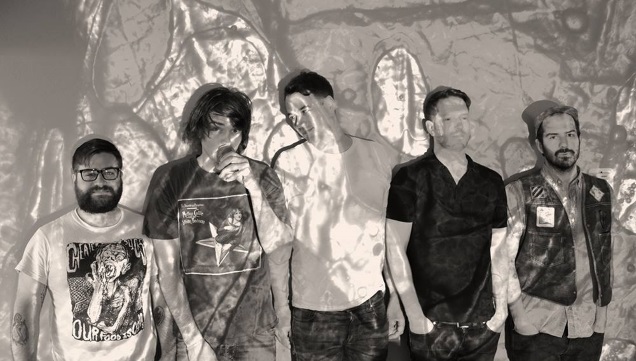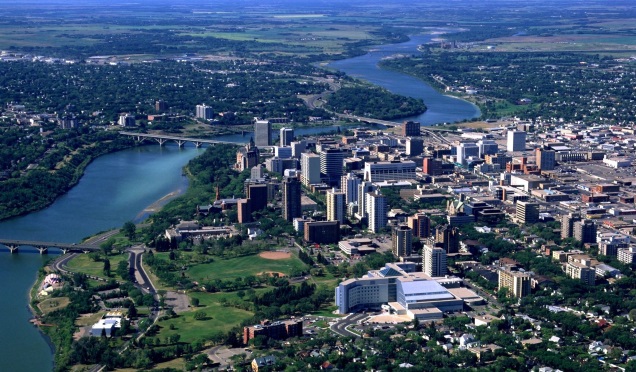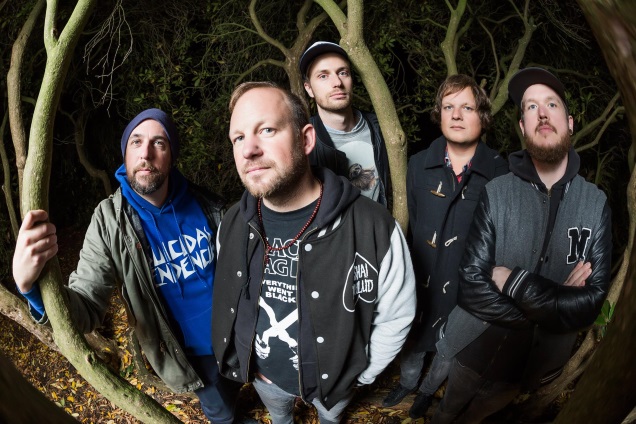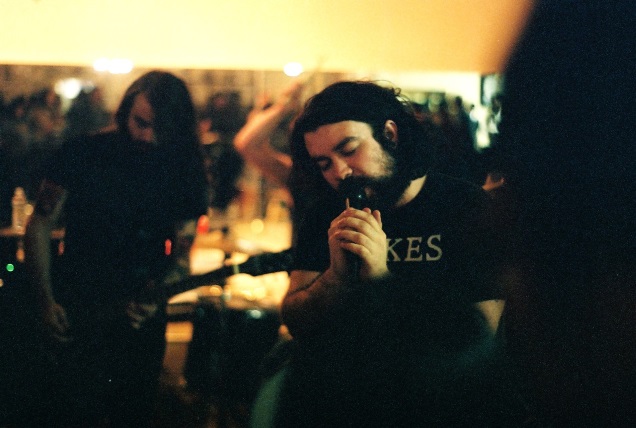In conjuction with the release of their new album “100% Sunshine”, we recently sat down with Saskatoon, Saskatchewan’s rock band SLOW DOWN MOLASSES to introduce their work, discuss their inspirations, live appearances in Europe, and reveal some details of the newest record. SLOW DOWN MOLASSES make indie rock by way of shoegaze and dream pop, not as much blurring the lines between moods as successfully adding components of the latter to the former, and we were fortunate enough to learn more about their process. Scroll further down to read our interview, conducted over the course of August and September 2016.
SLOW DOWN MOLASSES‘ third album “100% Sunshine” came out September 2nd on Noyes Records.
The music of Slow Down Molasses reflects the aesthetic, environment and paradoxes of life in Saskatchewan. Summers on the Canadian prairies are glorious and bright. In June the sunsets linger for hours – as late as 11pm one can still see a patch of blue sky to the northwest, as if the land is clinging to the last vestiges of a glorious day, stubbornly reluctant to let the summer end. And when total darkness hits, it’s only four hours until the sun peers over the eastern horizon once again.
The prairies make for an environment of extremes: winters are as unforgiving and dark as summers are optimistic and bright, and that bipolar nature heavily informs the band’s new album. The irony of its title, 100% Sunshine, quickly becomes apparent as the Saskatoon five-piece tackles the idealisation of success, what society deems a “normal” life, and the spectre of depression lurking underneath a quixotic façade. Is the pursuit of a dream amidst growing responsibility at home worth it in the end?
In past years Slow Down Molasses felt more like a loose collective than a band, with various friends and peers chipping in to help bring singer/guitarist Tyson McShane’s musical vision to life. That has changed with 100% Sunshine, as the musicians who toured behind 2015’s Burnt Black Cars also play on the new record (McShane is joined by drummer Jordan Kurtz, bassist Chris Morin, guitarist/keyboardist Aaron Scholz, guitarist Levi Soulodre and keyboardist/singer Jeanette Stewart). With the chemistry that comes from extensive touring, Slow Down Molasses are a tighter unit than ever, which in turn lends a sense of urgency to the new music. It’s as if the contrast in the band’s sonic portrait has been tweaked: the whites are brighter, the blacks denser.
Produced by Chad Munson and mixed in Glasgow by Tony Doogan (best known for his work with Mogwai and Belle & Sebastian), 100% Sunshine channels the bleaker side of indie rock, evoking shoegaze, dream-pop, psychedelic rock and darkwave at once. “Moon Queen” is a superblast of searing noise in true early-1990s form, contagious four-on-the-floor rock’n’roll underscored by waves of drone and feedback. Underneath the seeming effervescence is crippling melancholy, as McShane drawls, “I do not believe that we share the same dream / As you’re flying high and I’m sitting here, just burning out.”
The rampaging “New Release” weaves heavy rock, shoegaze and gothic elements skilfully, coming across as a mix of the Cure’s “A Forest” and Swervedriver’s “Last Train to Satansville”, the two sides creating a dynamic give-and-take hinting at inner conflict. “Levitation Sickness” hearkens back to the glory days of 1990s indie rock, its massive layers of guitars reminiscent of Dinosaur Jr., Sugar and Sebadoh. The Slint-esque “No Riots” and the post-punk flavoured “Ghosts & Vodka” date back nearly two decades, a constant presence in McShane’s songwriting arsenal yet only now finding the arrangements – and musicians – to make the tracks work on record. As the Rachel Goswell to McShane’s Neil Halstead, Stewart helps bring the album to a sublime denouement on the fittingly Slowdive-esque “You Made Me a Ghost”, her gentle, heavily reverbed, barely comprehensible singing giving the song an air of mystery and ethereality.
There have been so many Canadian artists featured here on IDIOTEQ, but there hasn’t been even one Saskatoon, Saskatchewan native that could introduce it to our readers. Given this and my love for geography, I am forced to start off with some questions about your area, I hope you don’t mind.
I associate Saskatoon with quite a remote location and I’m so glad you’re here to dispel the myths :) Tell us a bit about your closest area, how do you view your hometown and how does it influence and impact your work with SLOW DOWN MOLASSES?
In lots of ways you are right about Saskatoon being fairly remote, at least relative to larger cities. We’re 2000 km from Vancouver and likely close to 3000 km from Toronto, which puts us fairly close to the geographic centre of North America. Saskatchewan as a province is also a very large area, featuring a relatively small population. For context it is about twice the size of Poland, but only has one million people living in it and about 98% of those are in the southern half, so you can head out into the rural areas, you can drive down roads where you may not see any houses or other vehicles for miles.
All that said Saskatoon is thriving city of 300,000 people, that has a really great music and art scene, so it’s not as if we’re off an isolated wasteland. Living in a small city like this means the music scene is a small scene and everyone tends to know everyone. It also means that it is a very supportive, DIY focused scene. So it is often the case that bands help each other out, sharing connections and ideas for booking tours or making records. In the case of our band, it means that we’ve had a ridiculous amount of people either play live with us or record with us over the years. I haven’t added it all up, but I’m sure there has been more than 40 people either play live or on record with us and that is a tribute to our wonderful, small scene. If someone can’t make a tour, it’s easy enough to find a friend to fill in, or if we need some help with a record, we don’t have to look far to find it.
Oh, I’d love to come down to your areas and feel its energy.
How have you come to develop such a deep appreciation of nature and this interesting concept of its diffusion into reflexive sociological commentary? Tell more about some of the most important themes and concepts that you address with your new record and their relation with nature.
It is a lovely area, but one many people don’t intentionally visit because it is so far from most major centres and there isn’t a major draw (i.e. the mountains, the ocean, etc) to get people there.
As for themes and concepts on the album and their relation with nature, there is not a lot that sits in that realm. This album really became much more of an inwardly focused album than our last one, thinking more about human nature, than anything. I spent a lot of time this last year ruminating on the ideas personal motivation and personal value, specifically in the sense of why we do things and how we justify our actions to ourselves, both in positive and not so positive ways. A lot of those ruminations led to fairly bleak lyrics focused on obsessive personalities and situations of disassociate behaviour. Part of this was due to being around people who were wrestling very real existential demons, but part of it was also due to trying to think rationally about why we continue to put in ridiculously long hours and take on significant financial risk to continue to record and release records. It really got me thinking of how many times we make choices that aren’t necessarily rational, but because something may seem to fill our lives with some unquantifiable meaning. Sometimes that can be a romantic and beautiful thing, but sometimes it can involve much less healthy habits or thought processes to help fill that spiritual void.
Is there a particular line or song that captures what you wanted to achieve with this release?
Moon Queen and New Release do a nice job of capturing the spirit of this record. Lyrically both hit on the theme’s I mentioned above, but from different perspectives and they both ride the line nicely between being overwhelmingly noisy, while still being concise, direct songs…..or at least a more concise, direct type of song for a band like us!
Music wise, how much freedom is in your work as far as the expression is concerned? Is there a lot of space for improvisation in different stages of your creative process?
It’s a fairly free situation. From the start of this band, I’ve been pretty deliberate with trying to work with people I’m a fan of and felt that if I put the right people in the room and trust their instinct, we’ll end up with a better, more interesting record. I’m not a trained musician and sometimes I’m amazed at how many, very skilled, highly trained, musicians have trusted my rambling attempts at trying to describe what I want to do with a song. I think part of that comes from the general trust and appreciation of our collected aesthetic.
With this current line up of the band, we’ve really fallen into a very easy working relation for song writing. I do still bring mostly completed skeletons of songs, but equally there are songs on this record that came from the band improvising in our jam space. It’s a great thing that makes me excited to write some more. I think more than ever, we’re on the same page musically, so it’s been easy to trust each others instincts and let new ideas come from random improvisations. 100% Sunshine is definitely the most collaborative record we’ve made and I suspect anything we do from here on in will be even more so.
Ok guys, you are hitting some European locations in late August and September. Tell us more about that trip and how hard was it to organize it.
Yes! We’re flying over to play End of the Road Festival and Incubate Festival. Two amazing festivals that I’m so happy to be returning to. And around those we put together a string of UK and European dates. Tour booking always an interesting, and occasionally frustrating process. At this point we have a series of great, go to people for shows in cities throughout Canada, the United Kingdom, and Europe, as a result 70% of this tour came together quickly and easily. Ironically the remaining 30% likely took ten times as much effort to look in, but it all came together and it’s a great mix of headline shows, festival sets and opening sets. We get to head back to some of my favourite cities (Berlin, Oxford, Tilburg, Cardiff), see some great friends, and play with some fantastic bands.
Incubate Festival will feature your exclusive mainland show. How did you pick this particular event?
Incubate is a special festival to me. Of any festival we’ve played, their programming is by far the most eclectic and the most fearless I’ve seen. They’ll program black metal next to free jazz, and indie rock next to art rap and harsh noise. Last time we played the festival (in 2012) legendary Los Angeles art rapper BUSDRIVER was on stage right before us and a couple hours before our proper set, I performed an improvized set as part of DAMO SUZUKI‘s (of kraut rock heros CAN) backing band, alongside a couple members of MOGWAI and a mix of musicians from the Netherlands and Belgium. I can’t think of any other festival we’ve been to that can make such a mix of genres and artists work, but Incubate does it seamlessly. It’s a really remarkable thing. Their curation is of the highest order, so when they asked us to be Artist in Residence, we didn’t think twice about accepting. It’s a huge honour and a great excuse to hang out in the wonderul city of Tilburg for four days.
Sounds amazing. Can’t wait to find my way there.
Have you been on a full European trek with SLOW DOWN MOLASSES before? Are there any foreign shows that were particularly memorable to you?
Yes, we’ve been very fortunate to tour Europe a few times. Including this latest trek, we’ve been over five times now, which kind of amazes me a bit. Through those five tours we’ve had some amazingly memorable shows, many, many wonderfully generous receptions and a few sketchy encounters!
A particularly memorable show for me was our first festival appearance in England, at the 2011 edition of End of the Road Festival. We played to what was likely the biggest crowd we’d ever played to up to that point and as soon as we were off stage we were swarmed for merch. It felt people were literally shoving money at us. It was quite overwhelming.
How do you view the differences between Canadian and European crowds, infrastructure, venues and all things related to the logistics of touring artists?
Often times the people are similar enough, but it is interesting to see how differently things run. In Europe you are often treated to full, big meals by the venue, wheras many times in Canada or the UK at best you are given some beer. Also the UK/Europe there is a much broader demographic that attends shows and I think the venues are part of that. In Canada many bar venues run super late. It’s not out of the ordinary for a headliner to go on at 12:30 or 1am, whereas most places we play in the UK and Europe, there are strict set times, with the show wrapping up at 11pm. It was bizarre to realize that the first time we went over to the UK, but it’s something I wish we had more of in Canada. There was such a great culture of people from many walks of life attending show, and then those who were still up for a drink, could head to another bar and get drunk and talk about the great show they just saw.
Also, the big obvious thing is everything is closer together in Europe. From Saskatoon we typically have to drive 6 to 8 hours for a show. Whereas many times in England we would just stay in one place and drive the hour or two back after our show and still be able to wake up late a relax in the morning. It makes it pretty easy to understand why we don’t get nearly as many tours from international bands coming through Saskatchewan!
Yup, that’s perfectly understood, but on the other hand, I’d give a lot to travel through your beautiful lands.
Ok, so in relation to your previous commentary on your local natural environment, I assume that you doing some travelling for the sake of your work can ve inspiring as well. What is your process for translating your experiences in foreign natural environments into your music? Is there any?
I wouldn’t say there is a definite process. It obviously has an effect, though I’d say it as much the music and culture of a place that has had an impact on us. I still remember our first U.K. tour and how much it reminded me and inspired me to take a bit of a step back in the way I was writing songs and be a lot more intuitive with what I was writing. That was largely inspired by being in the country that birthed many of the bands that were very important to me when I was really discovering music. I think being there gave me a better idea of the context of some of those bands and renewed my appreciation for them. It also just made me realize how important those bands were to me and made me a bit more comfortable not overthinking my writing, and to just go with what was coming naturally. The result was that songs came out much more in the realm of some of those formative influences (i.e. MOGWAI, SWERVEDRIVER, SLOWDIVE, MY BLOODY VALENTINE).
Ok, so back to Canada, you’ll be celebrating the release of your record in Saskatoon on September 16th. Tell us more about the show, other artists that will be joining you on stage and your future touring plans.
We are very fortunate to live in a city and province that has an incredible amount of bands that we love and are inspired by, so every time we put together a show of our own, we are very excited put together a mix of bands we are excited about. For the album release we had local hip-hop hero Kay the Aquanaut perform and a newer garage punk band called CHUNDER BUFFET OPEN. They are both great and it was so fun to play with them. Definitely track down their music and catch them live if you can.
As for touring plans, they are going to be fairly limited over the winter. We’re playing Big Fun Festival in Winnipeg in January and should be doing a few shows around that, but otherwise, we’re excited to be at home a bit more and get to work on some recording projects that we’ve been talking about. So maybe don’t expect a huge pile of tour dates, but you can definitely expect to be hearing from us a fair bit in 2017.
Looking back on your 10 year experience with SLOW DOWN MOLASSES, how has your work and approach to running a band changed over time?
The last 5 or 6 years it’s become a lot more focused, that is for sure. The first few years we had such basic goals. We just really wanting to release something and to go on tour. We weren’t that concerned about what or how, it was as much (I think) to prove that we could actually do it. The last few years we realized we couldn’t be on the road all the time, we’ve had to be a lot more strategic with what we do when. It’s meant that we tend to be pretty specific about what we do (i.e. playing festivals we love like End of the Road, Sled Island, or Incubate). It still often feels like we’re clueless about some of the more ambitious, industry things, but I’m ok with that. I think it’s resulted in most, or all, of our working relationships just being with people that we like hanging out with, so the fact that I often forget to give someone an album or pitch us as band isn’t as important. At this point band planning meetings more focus on what we’d specifically like to do (i.e. what countries are people really excited to get back to), than on what may be the typical, industry-demanded promo move and I’m really happy about that.
Alright guys, many thanks for your thoughts. Good luck on the road! The last words are yours.
Thank you for the chance for a nice extended chat. And thanks for reaching out from Poland. I grew with a few Polish people and spent a wonderful few weeks there 10 years ago and it’s perpetually been on my list of places that I hope to return to at some point. Hopefully that can happen at some point soon.











